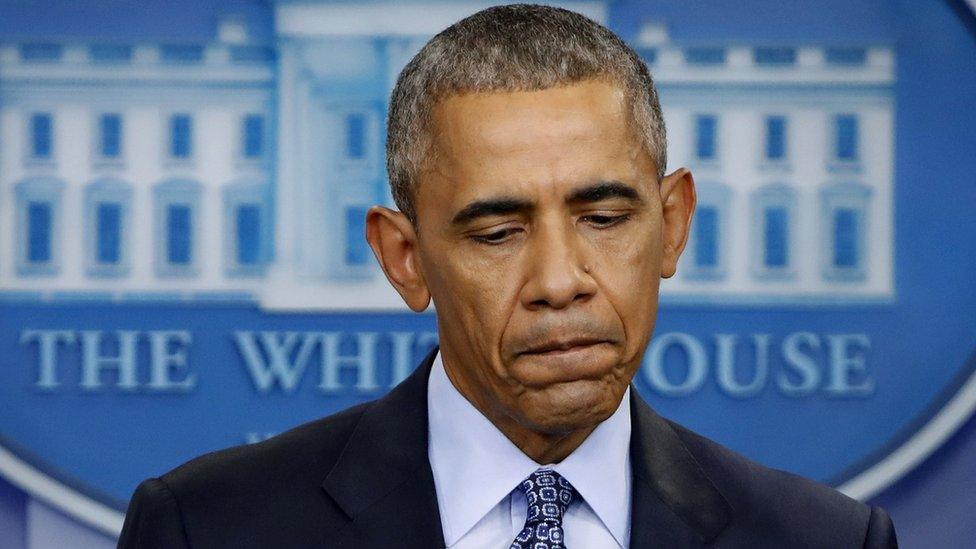Obama fears moment 'may be passing' for two-state solution
- Published

US President Barack Obama has said he fears "the moment may be passing" for a two-state solution in the Middle East.
In his final news conference, Mr Obama said December's UN resolution condemning Israeli settlements should be a "wake-up call".
He also warned his successor Donald Trump against any "sudden, unilateral moves" on the conflict.
Mr Obama was apparently referring to Mr Trump's plan to move the US embassy from Tel Aviv to Jerusalem.
Obama's advice to Trump: 'Reality has a way of biting back'
Mr Obama was criticised for breaking with Washington's tradition of using the US veto to block UN resolutions critical of Israel.
But the outgoing US president said on Wednesday: "The goal of the resolution was to simply say that the... growth of the settlements are creating a reality on the ground that increasingly will make a two-state solution impossible.

Obama plea falling on deaf ears? - Barbara Plett, State Department correspondent, BBC News
After twice failing to broker Middle East peace, President Obama is exiting office with a warning that a two-state solution to the conflict is fatally threatened by the expansion of Israeli settlements in the occupied West Bank. The message has been amplified by his Secretary of State John Kerry, and by America's rare abstention of a UN resolution condemning the settlement building.
The fear is that the internationally agreed foundation of the peace process is crumbling with no alternative to replace it. But the wake-up call seems to be falling on deaf ears in the Trump administration, which has taken the opposite approach. Trump has chosen as his ambassador to Israel a far-right, fervent supporter of Israeli settlements and opponent of Palestinian statehood.
He's also promised to break longstanding US policy and move America's embassy from Tel Aviv to Jerusalem. This has triggered Palestinian threats to withdraw their recognition of Israel, and Arab warnings of unrest. In a recent newspaper interview Trump said his son-in-law and senior advisor Jared Kushner would be the man to do a deal on Middle East peace. But the UN resolution had made that more difficult, Mr Trump said, because "the Palestinians are given so much".

"It was important for us to send a signal, a wakeup call that this moment may be passing."
Mr Obama said that during the transition, his team has sought to provide the incoming Trump administration with "the context in which the president-elect may want to make some of these decisions".
Barbara Plett-Usher explains what the UN Security Council's vote means
He declared that the "status quo is unsustainable" and said that early in his administration he decided to try to preserve the possibility of a two-state solution because he does not see an alternative.
Mr Obama cited a "rightward drift in Israeli politics" as well as the rise of terrorist groups in Syria as reasons for the failure to advance the peace process.
The issue of Jewish settlements is one of the most contentious between Israel and the Palestinians, who see them as an obstacle to peace.
About 500,000 Jews live in about 140 settlements built since Israel's 1967 occupation of the West Bank and East Jerusalem.
The settlements are considered illegal under international law, though Israel disputes this.

Farewell Obama
Barack Obama supporters on how they think he succeeded, and where he could have done more
